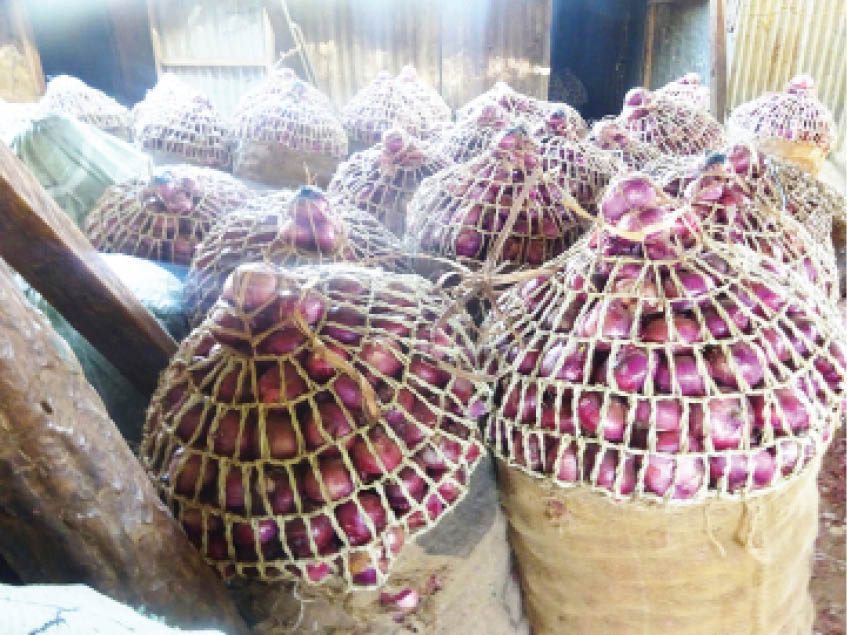By Abubakar Auwal
Malam Aliyu Isa is the national president of the Onion Producers, Processors and Marketers Association of Nigeria. In this interview he reveals how sanctions by the Economic Community of West African States (ECOWAS) are affecting onion business in the sub-region and Nigeria is losing a lot of money. He also speaks on the factors responsible for the rise in onion price in the country and what should be done to address it.
We are witnessing a rise in the price of onions in our local markets, particularly in the northwestern region, which is the main producer of the commodity, what do you think is responsible for this?
This is as a result of several factors. If you recall, our planting season used to start around October/November, then we harvest in the first quarter of the following year. So, during the time we started our planting, I think in 2022 to 2023, there was this issue of naira redesign, which did not afford our farmers the opportunity to even access cash to buy fuel, farm inputs and the rest. There was difficulty around that time, even with your money because majority of our farmers were not conversant with the issue of cashless economy.
There were a lot of issues and hardship, so many onion farmers had to abandon their farms because of the difficulty in accessing inputs. That reduced the number of hectres we put in production in the 2022 growing season, which of course affected the harvest of 2023, which was around March, April. And of course, when there is shortfall of production it will affect market forces of demand and supply. So, before you knew it, there was shortage of onions and the price rose. We used to buy in the clot season from N5,000 to N6,000, but last year, we started buying at N8,000, N10,000 and N13,000. The price continued to increase within the short period of time. In July, it was around N40,000.
Inside Nigeria’s Dormant Railway Networks
‘Electronic soil’ that can enhance crop growth by 50% developed by scientists
Around August, Kano State was supposed to be a place where we should have a lot of harvest. The state started to supply the commodity around July, August and September. It was supposed to continue till October for Sokoto to take over in November, but their supplies cut in September and that of Sokoto was not ready at that time.
There was a little shortfall between October and November, which caused the rise of the commodity above N100,000 per bag, even in the North where it is being produced. Up till now, the demand shock is still within the sub-sector. Our people cannot meet up with the current demand of onions because the supply is not enough. The price is still a kind of shock to us.
I predicted that the price would come down by now but it seems my prediction is being overtaken by other factors. Yesterday was market day in Sokoto and we started selling at N100,000, but it got to N103,000 before 12noon. There is no onion in the market. Go outside and you will see trucks of onion, which are supposed to take 260 to 300 bags, but they bought about 200 bags. There are no enough onions for them to fill their trucks so that they would depart to their destinations.
May we know the current demand in the country and the deficit?
The demand stands at 2.5million metric tonnes; and even at that, we only produced 2 million metric tonnes. And you know that because of our geographical position to some neighbouring African countries like Niger, Benin, Cameroun etc, we export onions.
It is also inside that 2 million that you have post-harvest losses. So you can now see that in the actual production, even without any post-harvest loss and export, we cannot meet up with domestic demands. When you couple it with export and post-harvest losses, you see that there is shortfall of close to 1million metric tonnes. So we can place our deficit to be around 1 million metric tonnes.
Why do we export when we produce 2 million metric tonnes and our demand is 2.5 million?
We need to export because we are dealing with perishable items. We need sophisticated facilities to preserve the commodity. If you do that using our local technology you are going to incur huge losses. And who will pay you for that?
That is why we need to look for a market so that you can have value for your produce.
Our main problem is not the issue of exportation but the post-harvest losses we are battling with. If we can preserve it off-season, then we don’t need to cry for shortage. We produce enough but we cannot preserve what we produce, so if we allow it to go into wastage we would suffer during the off-season
You have been complaining of post-harvest losses; how can this be addressed?
We are playing our part in terms of creating awareness and making information available to stakeholders like investors.
Imagine that you have a facility where you store 1,000 bags and only 10 per cent of it is lost and you have about 900 bags to sell at N50,000, you are talking about 400 per cent return. So, if you invest up to N100 million you would more likely get N500 million out of your investment.
In April 2023 we bought at N10,000, but now, if you see the commodity, nobody would sell it at less than N120,000.
What we are selling at N103,000 is new produce—rainy season onions that are supposed to go for N20,000 or N30,000. And if you have old onions, it is between N150,000 and N160,000 in Lagos. If you go to Ghana you can get almost N200,000.
During the conference we had in Kano in 2021, we found some Indian group constructing storage facilities at Kani. We are working hard to bring investors. We have Tesco Nigeria Limited, which is also trying to build storage facilities in Sokoto. Thank God that we are having onion processing plant close to BUA Cement in Kalambaina. They are building a well sophisticated processing plant that will create necessity for some people to start building sophisticated storage facilities.
I would like to draw the attention of our government to do a lot to attract investors by creating the enabling environment. Thank God that our governor, the governor of Sokoto, has just signed five executive orders meant to boost ease of doing business in the state. We have seen their efforts aimed at addressing insecurity in the state, which is very important in attracting investors.
ECOWAS imposed economic sanctions on Niger Republic over a forceful change of government, how does that situation affect onion business in that region?
When you close the border with Niger Republic, it is like you are closing all the land borders of northwestern states. That means we cannot export our commodities through land borders.
Our borders with Niger Republic are all closed, so our businesses in the whole northwestern states have closed.
The only place we have an open border to access another country other than Niger is when you go to Tsamiya axis.
Can you quantify how much Nigeria is losing in terms of forex related to onion export?
On onions alone, we started generating about USD429 million, but business is not moving because the borders are closed. When you need to export, it comes with a lot of stress and issues. And we are battling with domestic demands. Like I said, the Nigerian government is also losing despite that the tension is hitting Niger Republic and its citizens.
It is not only on onions but other commodities as well. When you see the volume of cement going into Niger through other countries, you will know that the Nigerian government is really losing a lot. I think we should think. Moreover, these Niger people are our brothers. We are Africans. I think we should be careful not to commit crime against humanity.

 Join Daily Trust WhatsApp Community For Quick Access To News and Happenings Around You.
Join Daily Trust WhatsApp Community For Quick Access To News and Happenings Around You.

